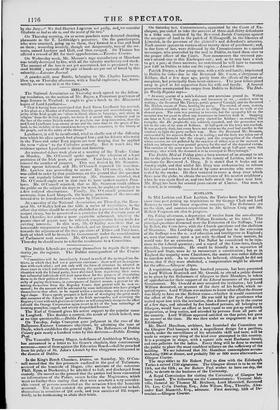IRELAND.
The National Association on 'Thursday week agreed to the follow- ing resolution, on the motion of Mr. Boyce, a Protestant gentleman of krge fortune in Wexford : it ought to give a finish to the Ministerial hopes of Lord Lyndhurst- " That it having been ascertained that Lord Baron Lyndhurst has asserted, 11 his place as a Member of Parliament, that the great and overwhelming ma- jority of the Irish people are 'aliens in blood, aliens in language, and aliens in religion' from the British people, we deem it a sacred duty, solemnly and in the face of the entire British nation to pruelaim our deep conviction, that the said Lord Lyndhurst is an enemy at one and the same time to the peace of Ire- land, to the stability of the connexion between these countiies, to the liberty of the people, and to the safety of the throne."
Lyndhurst, it will be recollected, tried to shuffle out of the difficulty into which his alien speech had plunged hint ; and his friends who write in the Times and other Tory papers are now denying that he applied the term "alien " to the Catholics generally. But it won't do ; the evidence against Lyndhurst is direct and daunting.
An animated debate took place at a meeting of the Trades Union on Monday. Mr. O'Connell spoke against the adoption of a legal
provision of the Irish pour, at present. Poor-laws, be said, had in- creased the number of paupers. This was denied by Mr. Staunton. Some uproar followed, and Mr. O'Connell repeated his assertion. Mr. Lawless was proceeding to answer Mr. O'Connell ; when he was called to order by that gentleman, on the ground that the question was not regularly before the meeting. Mr. Staunton retorted, that Mr. O'Connell ought not in that ease to have spoken against Poor- laws. Mr. O'Connell rejoined, that as Mr. Staunton could address the public on the subject six days in the week, he ought not to object to a few isolated observations. Finally, Mr. O'Connell promised to ascertain, from Lord Morpeth, the leading provisions of the measure intended to be introduced next session by Ministers.
At a meeting of the National Association, on Thursday, the Reve- rend Mr. O'Malley laid on the table a series of resolutions, to the effect that tithes should be utterly abolished as a provision for the Pro- testant clergy, but be preserved as a provision for the destitute poor of both Churches, but under a more equitable aplotmeet, whereby the poorer class of payers may be relieved, compensation being made for existing interests. In this way, Mr. O'Malley considers that all honourable compromise may be effected, and an important step tsken towards the adjustment of the two questions of Tithes and Poor-laws, both of which will be brought by Government under the consideration of Parliament next session. Mr. O'Connell gave notice, that next Thursday he should move to refer the resolutions to a Committee.


























 Previous page
Previous page